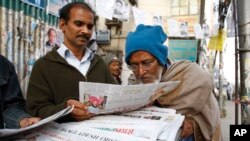Editors of major daily newspapers in Bangladesh’s capital formed a human chain on Monday to protest a new digital security law they say will stifle freedom of speech and media freedom.
Members of the Editors’ Council formed the chain in front of the National Press Club in Dhaka and demanded amendments to the recently enacted Digital Security Act, saying many provisions could be used against journalists.
Some editors sympathetic to Prime Minister Sheikh Hasina also joined the rare protest, which was backed by most journalists across the country.
The editors acknowledged the existence of media malpractice and widespread ethics violations, but urged that a press council be strengthened to resolve disputes over any misreporting, and said regular courts can handle defamation and libel cases without the need for police to search journalists and seize digital equipment.
Mahfuz Anam, the editor of the country’s leading English-language newspaper, Daily Star, read the editors’ demands and urged Parliament to change the law.
Anam, who is also general secretary of the council, said nine provisions of the law needed to be changed to ensure that freedom of speech is not compromised.
President Abdul Hamid signed the bill into law despite promises by three Cabinet ministers and an adviser to Prime Minister Sheikh Hasina that journalists’ concerns would first be addressed.
Hasina has defended the law, saying it is meant to protect the country from propaganda and misinformation.
“Journalism is surely not for increasing conflict, or for tarnishing the image of the country,” she said earlier.
Opponents say the law is part of a broader campaign to silence government critics.
Journalists in Nepal are fighting a similar law, part of an expansive rewriting of that country’s civil and criminal codes meant to define the parameters of the country’s new constitution.
Journalists say such laws could make it more difficult to expose corruption.
Bangladeshi journalists are particularly concerned about a section of the new law that provides for up to 14 years in prison for anyone who gathers, transmits or preserves classified information from any government agency using a computer or other digital device. They say publishing such information is a way to hold officials accountable. The section evokes the sentiment of a British colonial-era law protecting official secrets.
The law also authorizes prison sentences of up to three years for publishing information that is “aggressive or frightening” and up to 10 years for posting information that “ruins communal harmony or creates instability or disorder or disturbs or is about to disturb the law and order situation.”
Human Rights Watch said the law is open to abuse because it allows police to search or arrest suspects without a court order.




